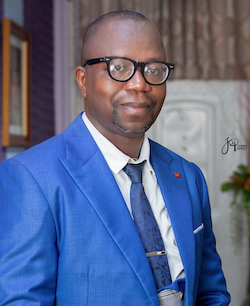Research into the use of plastic waste in obtaining fuels has been ongoing over the past decade. Zeolites USY and in some cases rare earth USY, ZSM-5, mordenite and beta have been the main types of zeolites used in catalysis over the years. We investigate the catalytic properties of zeolite type LTA and LSX in enhancing the pyrolysis of plastic waste from sachet water in Ghana.
Specific objectives include:
- Synthesis and characterization of zeolite type LTA and LSX from kaolin.
- Determination of physical properties of pyrolysis fuel produced from waste plastics.
- Determination of components of the pyrolysis fuel.
- Determination of the reaction kinetics for the decomposition process.
Click on the link below to view a recording of the talk:
Biography

Professor Bright Kwakye-Awuah is an Associate Professor in the Department of Physics, Kwame Nkrumah University of Science and Technology (KNUST), Kumasi. He obtained his MSc. Degree in Environmental Physics from the University of Bremen, Germany having obtained his BSc. Degree in Physics from the University of Cape Coast, Ghana. He completed his PhD from the University of Wolverhampton, United Kingdom after which he took up an appointment with KNUST. Professor Kwakye-Awuah is, without doubt, an upcoming leader in the area zeolite science and technology; not only as he synthesized a number of novel zeolites, but he has also pioneered and championed their use in a wide variety of medical, environmental and industrial settings. He has taken a wide range of industrial academic collaborations that have resulted in real world solutions to difficult industrial problems. Professor Kwakye-Awuah is the Lead Research Scientist for the Zeolite Science and Technology Research Group, a multi-departmental research group in the University. He also heads the Materials Science and Technology Section, of the Department of Physics, KNUST. He has synthesized a number of novel zeolites and has undertaken a wide range of the applications of the zeolites. He has also pioneered industrial-academic collaborations that have resulted in real word solutions to difficult industrial problems. He has, through a number of grants, trained five PhD students, with several others in various stages of their research project. He has also trained several MPhil students and currently engaging new MPhil students in different projects in the area of Zeolite Science and Technology.




